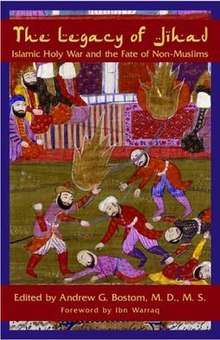The Legacy of Jihad
The Legacy of Jihad: Islamic Holy War and the Fate of Non-Muslims is a book by Andrew Bostom, a medical doctor who has written several other works discussing Islamic intolerance. The foreword was written by author and ex-Muslim, Ibn Warraq. The book is framed as a rejection of the notion that Islam is a peaceful religion and sets out to prove that Islam is violent and intolerant.
 The Legacy of Jihad cover page | |
| Author | Andrew G. Bostom |
|---|---|
| Country | United States |
| Language | English |
| Subject | Jihad |
| Genre | Islamic history |
| Publisher | Prometheus Books |
Publication date | 25 October 2005 |
| Media type | Print (Hardcover, Paperback), E-book |
| Pages | 759 |
| ISBN | 978-1591026020 |
| OCLC | 900607541 |
| Followed by | The Legacy of Islamic Antisemitism |
Contents
The book provides a textual analysis of the concept and practice of jihad ("war against unbelievers in the path of Allah") by examining Islamic theological and legal texts, eyewitness historical accounts of Muslim and non-Muslim chroniclers, and essays by scholars analyzing jihad and the conditions imposed upon the non-Muslim peoples conquered by jihad campaigns.[1]
Reception
The Jerusalem Post calls The Legacy of Jihad "a breakthrough inasmuch as the enormous task of assembling together all the major sources which govern the holy war in Islam had never been attempted before,"[2] Matt Carr writing in Race & Class, described Bostom as a "protégé" of Bat Ye’or, and described Bostom's perspective of Islam as reducing to the acronym "‘MPED’ – massacre, pillage, enslavement and deportation".[3]
Sources
- Bostom, Andrew, ed. (2005). The Legacy of Jihad: Islamic Holy War and the Fate of Non-Muslims. Prometheus Books. ISBN 1-59102-307-6.
- The Legacy of Jihad
- https://web.archive.org/web/20061014093116/http://www.americanthinker.com/articles.php?article_id=4616
- The Legacy of Jihad Reviewed by Lee Harris
- All Jihad All the Time
See Also
References
- Johannes J.G. Jansen (Winter 2008). "The Legacy of Jihad: Islamic Holy War and the Fate of Non-Muslims". The Middle East Quarterly. XV (1).
- /servlet/Satellite?cid=1210668642954&pagename=JPost%2FJPArticle%2FShowFull Archived May 19, 2008, at the Wayback Machine
- Carr, M. (2006). "You are now entering Eurabia". Race & Class. 48: 1–22. doi:10.1177/0306396806066636.
External links